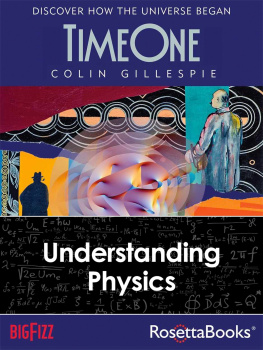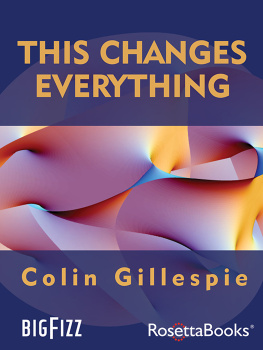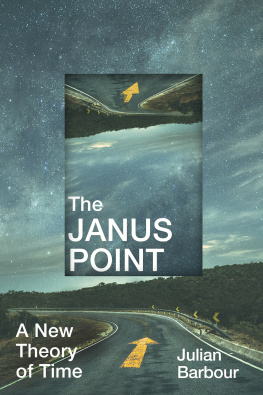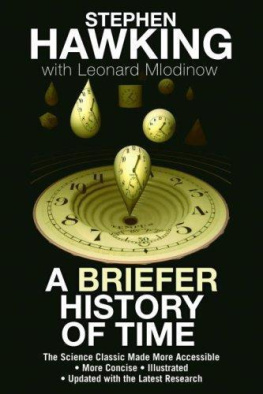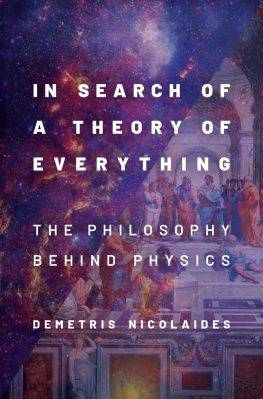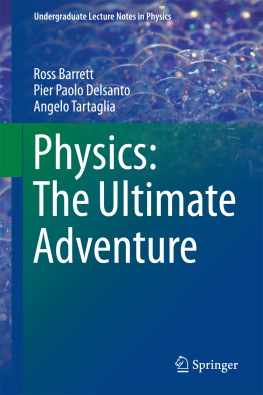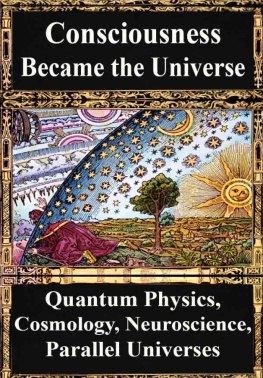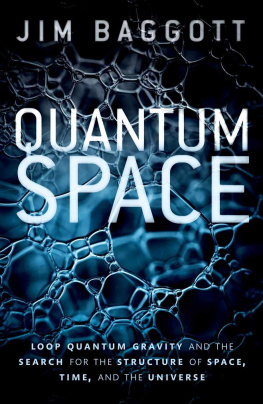Time One
Discover How the Universe Began
Colin Gillespie
Copyright
Time One: Discover How the Universe Began
Copyright 2013 by Colin Gillespie
Cover and book design by Grandesign, Ltd.
Cover art 2013 Big Fizz Inc., based on an original work by Cyrus Smith
The original of the embedded Calabi-Yau manifold image on the cover was made by Wikimedia user Lunch, following instructions provided by Andrew Hanson of the University of Indiana.
Sources of quoted materials can be found at www.timeone.ca.
All rights reserved. No part of this book may be used or reproduced in any form or by any electronic or mechanical means, including information storage and retrieval systems, without permission in writing from the publisher, except by a reviewer who may quote brief passages in a review.
Electronic edition published by Big Fizz Inc. 2013 and distributed by RosettaBooks LLC, New York.
ISBN ePub edition: 9780795333521
BOOK ONE OF THREE
Theme of the Work
Science is the study of emergence
Religion is reflection on all else
The beginning brings them both together
For those without whom this work would not be
Joan, Don, Brian, Carolyn and all who wrought
and the many more who thought and taught
I am asking a question which has to be asked at the beginning of an enquiry about anythingwas the world, I say, always in existence and without beginning? or created, and had it a beginning?
Plato (360 BCE)
In imagination there exists the perfect mystery story. Such a story presents all the essential clews, and compels us to form our own theory of the case.
Albert Einstein & Leopold Infeld (1938)
Where and when it all began still remains the most intractable problem of modern cosmology.
Andrei Linde (1994)
Contents
In the beginning, he said, exactly fifteen point two billion years ago, there was a Big Bang and the Universe
I had stopped writing. Fifteen billion years ago? I said incredulously.
Absolutely, he said. Im inspired.
Isaac Asimov (1979)
We are all, each in our own way, seekers of the truth and we each long for an answer to why we are here.
Brian Greene (1999)
I wanted to understand how the universe began.
Stephen Hawking (2001)
For the first time in the history of science, we have at least a chance of putting together a sensible theory of time and the evolution of the universe.
Sean Carroll (2010)
The Big Bang model says nothing about what banged, why it banged or what happened before it banged.
Manjit Kumar (2012)
It is the ultimate mystery. Humankind has long sought the answer, maybe since the dawn of thought.
Is an answer within reach? Some say there was no beginning. In 1927, Bertrand Russell says, There is no reason to suppose that the world had a beginning at all. The idea that things must have a beginning is really due to the poverty of our imagination. Really? When he says this, concepts of the cosmos are a speculative sinkhole. But soon science says hes wrong: There was some sort of a beginning. How can science say so? It unleashes a tsunami of new evidence, a picture from a moment nearly 14 billion years ago. Suddenly we can see that far back in time! The picture shows the Big Flash, light let loose as space becomes transparent. It shows the universe when its an infant, less than 400,000 years old. Before the Big Flash, space was as opaque as thick lead bricks so the beginning is forever hidden from our view.
The fact that the universe began with a Big Bang is widely known. Its also wrong. The Big Bang model describes how the early universes dense, hot matter expands and cools. That is, it shows what happened after the beginning. It predicts things that we see today. Most physicists think something like it happened. But whatever happened, they know that the Big Bangs not how it began. Why not? Because it doesnt say how it got to be dense and hot. Thanks mostly to this model, cosmologists believe they know how the whole universe evolved through all the years that followed its first fraction of a second. But this makes it all the more surprising that they dont know how it began. Its not that they have no ideathey have lots; but so far none that hang together.
This book takes a new approach: It follows a fictional detective and his sidekick. Their job is to untangle clues and work out what went on. Theyre not always a happy team. But as they struggle on they find theres lots of evidence.
Every fictional detective knows that he or she is to make sense of all the clues. But scientists, says Edward Wilson, do not look at the big picture; they must focus on their bit of it or they get left behind. This book is all big picture. It aims to discover how the universe began and cast new light upon the mystery of our existence. The fictions aimed at being helpful in discovering whats real. Through ancient puzzles and more recent revelations there are many twists and turns. The key to keeping track is this: Just follow the detective. He defies the odds and finds a simple answer. How will readers know its true? Well, as in all detective stories, it explains so many things that once seemed inexplicable.
Here, dear reader, please be warned. You are entering a world that needs novel ways of thinking. It may change your view of what is real. Few of its elements are new and many of them netted Nobel prizes but here they coalesce into a radical new vision, a universe thats beautiful (a word with special meaning for philosophy and physics) and singularly simple. Readers can acquire what Infeld calls the greatest pleasureunderstanding.
The book has many quotes, some before each chapter, others in the text. They are integral to the story. And on the website theres a Cast of Characters (the players in this drama of the Modern Age), a Glossary of Terms (shown in Italics upon first use in the text and with a Capital thereafter), and much more information. Links (and of course Web searches) lead to other aspects so the reader is invited: Check it out.
Some power there is that draws mens eyes and hearts up and outward, beyond the heavy clay that fastens them to earth.
Mary Stewart (1979)
The results have given physicists confidence that we understand the origin of the universe to within a fraction of a second after the Big Bang. However, we are still left with the embarrassing questions of what preceded the Big Bang and why it occurred.
Michio Kaku (1994)
Extrapolating all the way [back] to the beginning, the universe would appear to have begun as a point in which all matter and energy is squeezed together to unimaginable density and temperature.
Brian Greene (2003)
Cosmology is the scientific attempt to answer fundamental questions of mythical proportion: How did the universe come to be? How did it evolve? How will it end?
Charley Lineweaver (2003)
Tracking the history of the Universe from the instant after the Big Bang is a stellar achievementbut it leaves unanswered the fundamental question of how the Big Bang started in the first place.
Patricia Fara (2009)
Finding how the universe began turns out to need two new approaches. One is simply to begin at the beginning. The reader may think it odd that anything so obvious is new. These days it is. But trying it has fallen out of fashion. Experience suggests its risky. And, too, the physics that should help turns out to stray amid a maze of problems. To the detective all these problems help to crack the case; they are the clues. So the other new approach is this embrace of many problems. A famous case may illustrate the way this works.

